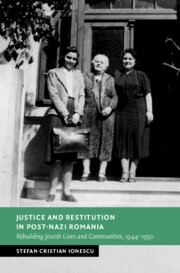Book contents
- Justice and Restitution in Post-Nazi Romania
- New Studies in European History
- Justice and Restitution in Post-Nazi Romania
- Copyright page
- Dedication
- Contents
- Figures
- Acknowledgments
- Abbreviations
- Introduction
- Chapter 1 Post-Nazi Romania and Its Political, Social, and Economic Context
- Chapter 2 Rebuilding Jewish Lives and Communities
- Chapter 3 Negotiations and Drafting of the Main Restitution Laws
- Chapter 4 The Public Opinion and the Topic of Restitution
- Chapter 5 Negotiating the Peace Treaty and the Boundaries of Jewish Rights with the Allies
- Chapter 6 Restitution through Court Litigation
- Chapter 7 Communist Nationalizations, Jewish Property, and Emigration
- Conclusion
- Bibliography
- Index
Introduction
Published online by Cambridge University Press: 06 January 2025
- Justice and Restitution in Post-Nazi Romania
- New Studies in European History
- Justice and Restitution in Post-Nazi Romania
- Copyright page
- Dedication
- Contents
- Figures
- Acknowledgments
- Abbreviations
- Introduction
- Chapter 1 Post-Nazi Romania and Its Political, Social, and Economic Context
- Chapter 2 Rebuilding Jewish Lives and Communities
- Chapter 3 Negotiations and Drafting of the Main Restitution Laws
- Chapter 4 The Public Opinion and the Topic of Restitution
- Chapter 5 Negotiating the Peace Treaty and the Boundaries of Jewish Rights with the Allies
- Chapter 6 Restitution through Court Litigation
- Chapter 7 Communist Nationalizations, Jewish Property, and Emigration
- Conclusion
- Bibliography
- Index
Summary
On October 27, 1944, the editors of Neamul evreesc (The Jewish Nation), one of the main Jewish national newspapers, published an editorial entitled “We Want Justice: One Hour Earlier” (Vrem dreptate: cu un ceas mai devreme) reflecting the most important requests of the Jews of Romania to help them rebuild their lives after the Holocaust. They represented the voices of the largest Jewish community in postwar Europe outside the USSR, estimated at 428,000–450,000 people in 1947. Arguing that expropriation of property and denial of rights was the second worst category of antisemitic crimes perpetrated by the pro-Nazi dictatorship of General/Marshall Ion Antonescu between September 1940 and August 1944 (the first being mass murder, as Romania had been the largest Holocaust perpetrating country after Germany), the journalists emphasized that the Jewish survivors “expected with an understandable impatience that all the injustices they suffered be fully repaired” by the new democratic Romania. They expressed their disappointment about the delay of the “restitution in integrum” (full restitution) of their rights and wondered about the reasons behind it. Acknowledging the difficulty of repairing injustices and returning property taken by force and the lawmakers’ efforts to draft a restitution law, the journalists emphasized that postponing full restitution and reparations meant the perpetuation of suffering for many Jews. The journalists also argued that the Jews who were tortured in the camps or lost their family members were entitled to reparations and asked lawmakers to adopt a law to immediately address this injustice after the first restitution law would be enacted. This newspaper editorial encapsulates the problems, disappointments, and hopes of many Jewish survivors during their struggle to obtain restitution and rebuild their lives in Romania.
- Type
- Chapter
- Information
- Justice and Restitution in Post-Nazi RomaniaRebuilding Jewish Lives and Communities, 1944–1950, pp. 1 - 25Publisher: Cambridge University PressPrint publication year: 2025

